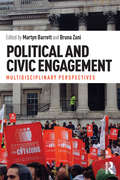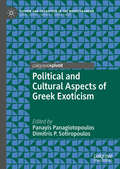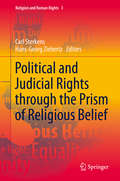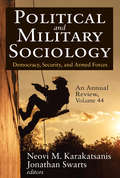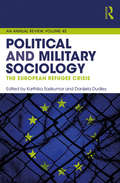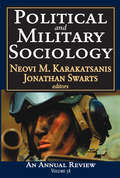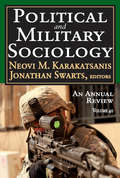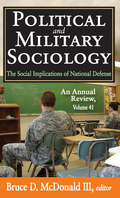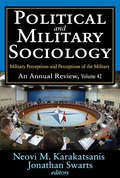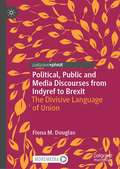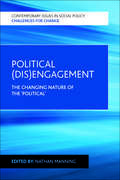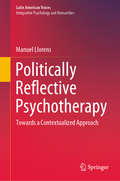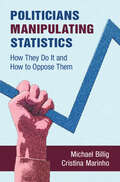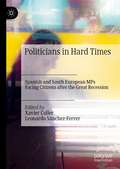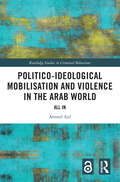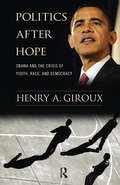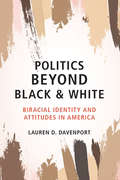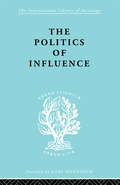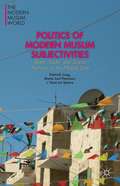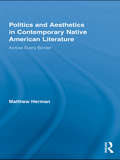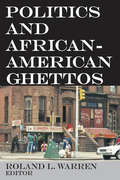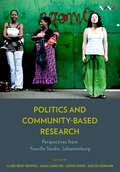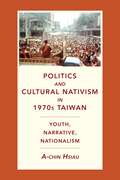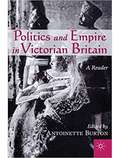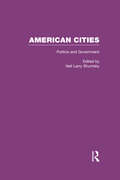- Table View
- List View
Political and Civic Engagement: Multidisciplinary perspectives (Adolescence And Society Ser.)
by Martyn Barrett Bruna ZaniBased upon a three-year multi-disciplinary international research project, Political and Civic Participation examines the interplay of factors affecting civic and political engagement and participation across different generations, nations and ethnic groups, and the shifting variety of forms that participation can take. The book draws upon an extensive body of data to answer the following key questions: Why do many citizens fail to vote in elections? Why are young people turning increasingly to street demonstrations, charitable activities, consumer activism and social media to express their political and civic views? What are the barriers which hinder political participation by women, ethnic minorities and migrants? How can greater levels of engagement with public issues be encouraged among all citizens? Together, the chapters in this volume provide a comprehensive overview of current understandings of the factors and processes which influence citizens’ patterns of political and civic engagement. They also present a set of evidence-based recommendations for policy, practice and intervention that can be used by political and civil society actors to enhance levels of engagement, particularly among youth, women, ethnic minorities and migrants. Political and Civic Participation provides an invaluable resource for all those who are concerned with citizens’ levels of engagement, including: researchers and academics across the social sciences; politicians and political institutions; media professionals; educational professionals and schools; youth workers and education NGOs; and leaders of ethnic minority and migrant organizations and communities.
Political and Cultural Aspects of Greek Exoticism (Reform and Transition in the Mediterranean)
by Panayis Panagiotopoulos Dimitris P. SotiropoulosThis book explores the new Greek exoticism by examining political and cultural mechanisms that contribute to Greece’s image and self-image construction. The contributions shed light on the subject from different perspectives, including political science, history of ideas, sociology, cultural studies, and art criticism. In the first part, the book provides a historical review with a focus on philhellenism, perceptions of antiquity and modernity, and the evolution of Greece as an idea. The second part looks at the current Greek crisis and analyses ideological, political and cultural aspects and stereotypes that contributed to the formation of contemporary Greek culture. The third and final part discusses notions such as aestheticism, idealism and pragmaticism, and deconstructs narrations of Greece through artistic media, such as films and exhibitions, which present a new oriental Utopia.
Political and Judicial Rights through the Prism of Religious Belief (Religion and Human Rights #3)
by Hans-Georg Ziebertz Carl SterkensThis innovative volume is focused on the relationship between religion on the one hand and political and judicial rights on the other. At a time when the so-called ‘checks and balances’ that guarantee the vulnerable equilibrium between legislative, executive and judicial branches of governance are increasingly under pressure, this book offers valuable insights. It presents empirical work that has measured young people’s attitudes and explains the variety found across their views. Readers will find answers to the question: To what extent do youths in different countries support political and judicial human rights and what influences their attitudes towards these rights? The political rights in this question include, among others, active and passive voting right, the right to protest, and the rights of refugees. Judicial rights refer in general to the right of a fair trial, and include principles like equality before the law; the right to independent and impartial judgement; the presumption of innocence; the right to legal counsel; and the privilege against self-incrimination. Expert contributing authors look at aspects such as religious beliefs and practices, personal evaluation of state authorities, and personality characteristics. The authors discuss contextual determinants for attitudes towards political and judicial rights, in both theory and empirical indicators. Numerous helpful tables and figures support the written word. This book makes an original contribution to research through the empirical clarification of factors that induce or reduce people’s support of political and judicial rights. It will appeal to graduates and researchers in religious studies, philosophy or sociology of religion, among other disciplines, but it will also interest the general reader who is concerned with matters of human rights and social justice.
Political and Military Sociology, an Annual Review: Volume 44, Democracy, Security, and Armed Forces (Political and Military Sociology Series)
by Jonathan SwartsThe latest volume of the Political and Military Sociology annual review features empirical research on topics that focus on security, military training, culture, and the challenges of bureaucracy, law, and violence in democracies. The articles cover an impressive geographic range from Europe to Africa and to the Middle East.Two essays address threats to democratic polities by corrupt governmental and legal institutions and by electoral violence and intimidation. The first argues that a culture of "dualism" in Greece helps produce problems. The second analyzes the power of military student fraternities in Nigeria, arguing that democracy is threatened by these organizations.Two contributors then address the security and military challenges in Iraq. The first argues that successful military advisors must play dual roles as both peacekeeper-diplomats and warriors. The second poses that Iraqi government policies privileging the Shia population have alienated other groups�and helped support for groups such as ISIS. The final essay analyzes the acculturation of new soldiers to Zimbabwean military life through the training experiences of recruits.The volume also includes reviews of recent books on military and security matters.
Political and Military Sociology: The European Refugee Crisis (Political and Military Sociology Series)
by Karthika Sasikumar Danijela DudleyThis special edition of Political and Military Sociology: An Annual Review encompasses a full range of coverage on the European refugee crisis. Contributions include a focus on the characteristics and motivations of modern-day migrants, an analysis of the inconsistent standards displayed by the European Union, and the militarization happening across parts of Europe in response. The volume leads with a discussion on the identity of the refugees: who are they and what are their reasons for leaving their homelands? Following chapters cover the response across Europe in countries including Serbia, Greece, Turkey, and Italy. The penultimate chapter examines the European Union’s inadequate response to the unfolding crisis, and the book concludes with a central analysis of the agreements between the EU and transit countries with remarks on the unintended consequences that have emerged.
Political and Military Sociology: Volume 38: An Annual Review
by Neovi M. Karakatsanis Jonathan SwartsPolitical and Military Sociology continues a mission of publishing cutting-edge research on some of the most important issues in civil-military relations. In this inaugural volume of the new annual publication, Won-Taek Kang tackles the issue of nostalgia for Park Chung Hee in South Korea, and analyzes why many South Koreans today appear to miss the deceased dictator. Ryan Kelty, Todd Woodruff, and David R. Segal focus on the role identity of U.S. combat soldiers as they balance competing demands made by the military profession, on the one hand, and solders' family and personal relations, on the other.D. Michael Lindsay considers the impact that social contact has on military and civilian participants in the elite White House Fellowship program, and analyzes how social contact affects the confidence in the U.S. military that civilian fellows later show. Analyzing letters to the editor of a local newspaper, Chris M. Messer and Thomas E. Shriver consider how community activists attempt to frame the issue of environmental degradation in the context of a local dispute over the storage of radioactive waste. David Pion-Berlin, Antonio Uges, Jr., and Diego Esparza analyze the recent emergence of websites run by Latin American militaries, and consider why these militaries choose to advertise their activities on the Internet.Political and Military Sociology also includes reviews of important new books in civil-military relations, political science, and military sociology. Included here are discussions of books about U.S. war crimes in Vietnam, civil-military relations in contemporary China, the structural transformation of the U.S. Army, Japanese security policy, American treatment of POWs, the Bonus March, and the GI Bill.The series will be of broad interest to scholars of civil-military relations, political science, and political sociology. It will continue the tradition of peer review that has guaranteed it a place of importance among research publications in this area.
Political and Military Sociology: Volume 40: An Annual Review (Political And Military Sociology Ser.)
by Jonathan Swarts Neovi M. KarakatsanisSeveral contributions in this volume focus on the modern Middle East, with other articles examining justifications for war, the return of war veterans, white nationalists, and the activities of the Moral Majority.Maria Markantonatou addresses the blurring of distinctions between civilians and combatants. Udi Lebel investigates how the IDF is being changed by the increasing number of religious-Zionists recruited. Orlee Hauser argues that the experiences of women in the IDF vary depending on their positions and assignments. Bruce McDonald compares the performance of the Feder-Ram and augmented Solow models in accounting for economic growth in Iran. Neema Noori examines the interrelationship of war, the state, and mobilization in Iran. Molly Clever examines the justifications for war employed by both state and non-state actors. Christina Knopf uses relational dialectics to examine US veteran transitions. David Bugg and Dianne Dentice analyze attitudes and perceptions of white nationalists. Finally, Aaron Davis considers the rise of the Illinois state chapter of the Moral Majority in the 1980s.This volume in the Political and Military Sociology series also includes reviews of important new books in civil-military relations, political science, and military sociology.
Political and Military Sociology: Volume 41, The Social Implications of National Defense: An Annual Review (Political And Military Sociology Ser.)
by Bruce D. McDonald IIIPolitical and Military Sociology, Volume 41 explores the social elements and impact of national defense. The origin of government is a response to a society's common interest in security and defense. In recent years, security and defense issues, and government responses, have become increasingly prominent in societies around the world. Despite intermittent pushes for privatization, however, security and defense have remained core functions of government.In this volume Bruce D. McDonald III investigates the historiography of the defense-growth relationship. Lachezar G. Anguelov and Robert J. Eger III consider the social impact with a case study of the Republic of Serbia. Maximiliano Mendieta and Bruce D. McDonald III consider the social spillovers of the sector that arise after the completion of a soldier's service. Paul Kellogg considers why some countries have fared well when others have been slow to rebound. Hamid E. Ali studies pork barrel spending in the United States. Susan Sample, Brandon Valeriano, and Choong-Nam Kang broaden the understanding of the defense sector to include its output. Hamid E. Ali and Ubah A. Adan conclude the volume with a study on conflict and infant and child mortality rates.Traditionally, national defense is viewed solely in military terms. As part of their national security objectives, many defense sectors have undertaken a variety of social programs. While the existence of social programs is known, what remains uncertain is how they spill over from the sector to society at-large and what is the impact of that spillover.
Political and Military Sociology: Volume 42, Military Perceptions and Perceptions of the Military: An Annual Review (Political And Military Sociology Ser.)
by Jonathan Swarts Neovi M. KarakatsanisThis volume of Political and Military Sociology focuses on the perceptions and identities of those serving in the military, using survey or interview data to explore those perceptions. A range of military forces are examined, including those of the United States, Israel, Norway, and Denmark.The first article, using survey data from Denmark, compares the views of Danish soldiers to civilians. The second article looks at the effects of military education upon the attitudes and values of soldiers. The third article explores Israeli soldiers' attitudes regarding formal military education. The fourth article addresses the impact of Norwegian soldiers' self-identity on military performance.In a different vein, the survey results of the fifth article show that support for soldiers on active duty in Iraq and Afghanistan does not necessarily translate into support for veterans. Military lawyers in the Israel Defense Forces are the subject of the sixth article. This volume concludes with an article that argues that military service should be offered as a legal policy alternative to incarceration.
Political, Public and Media Discourses from Indyref to Brexit: The Divisive Language of Union (Rhetoric, Politics and Society)
by Fiona M. DouglasThis book focuses on the language of two unions (the United Kingdom and the European Union), tracing the emergence of divisive discourses from indyref to Brexit. It explains the background to the creation of these unions and summarizes recent political events that have brought their future into question. It considers which identities (national, supranational, social, ethnic or racial) were invoked during the indyref and EU referendum campaigns, emphasising the crucial role played by language in maintaining these identities, in conceptualizing the nation, to do politics, and its power to unite or divide. Based on analysis of three specialist corpora totaling over 143 million words and comprising multiple text types (newspapers, speeches, Twitter posts, parliamentary debates, party political websites and campaign materials), it interrogates the language used by politicians, the media and the public, uncovering increasingly problematic, scaremongering, xenophobic and incendiary linguistic strategies used to divide us from them.
Political: The Changing Nature of the 'Political' (Contemporary Issues in Social Policy)
by Edited by Nathan ManningIn what ways is the meaning and practice of politics changing? Why might so many people feel dissatisfied and disaffected with electoral politics? What approaches do political activists use to raise issues and mobilise people for action? What role does the internet and social media play in contemporary citizenship and activism? This book brings together academics from a range of disciplines with political activists and campaigners to explore the meaning of politics and citizenship in contemporary society and the current forms of political (dis)engagement. It provides a rare dialogue between analysts and activists which will be especially valuable to academics and students across the social sciences, in particular sociology and political science.
Politically Reflective Psychotherapy: Towards a Contextualized Approach (Latin American Voices)
by Manuel LlorensThis book shows how clinical psychology has been deliberately used to label, control and oppress political dissidence under oppressive regimes and presents an epistemological and theoretical framework to help psychologists deal with the political dilemmas that surround clinical practice. Based on his own experience working as a clinical and community psychologist in Venezuela for almost twenty five years, the author recounts the controversial history of how the Bolivarian Revolution has used psychology to persecute and oppress political dissidents, recovers the experience of doing psychotherapy under oppressive regimes in other countries and stresses the importance of developing an ethically and politically aware clinical practice. The first part of the book presents the dilemmas psychotherapists have faced in different parts of the world, such as the former Soviet Union, USA, China, Spain, Hungary, Argentina, Brazil, Uruguay, and Venezuela when dealing with the intrusion of the political domain in clinical research and practice and the difficulties clinicians have had in dealing with these issues. The second part of the book presents an epistemological and theoretical framework from which these issues may be tackled effectively. The book helps raise awareness of the risks of framing psychotherapy as apolitical as well as the benefits of thinking of our lives as contextualized in our political settings. It draws from several theoretical options that have been useful to challenge traditional clinical theory and include the political in our clinical comprehensions. In particular Latin American Community Psychology, that has developed tools to favor awareness of political issues, has been used to expand the psychotherapeutic conversation.Politically Reflective Psychotherapy: Towards a Contextualized Approach will help clinical psychologists, psychiatrists and other social and mental health workers reflect on the challenges psychotherapy faces in a politically polarized society, showing how the political dimension can be incorporated into clinical practice.
Politicians Manipulating Statistics: How They Do It and How to Oppose Them
by Michael Billig Cristina MarinhoHighly original and insightful, Billig and Marinho's book investigates how politicians misuse official statistics. Setting this problem in its historical context – and offering vivid case studies of Donald Trump, Boris Johnson and Gérald Darmanin – the authors demonstrate that the manipulation of statistics involves the misuse of words as well as the misuse of numbers. Most importantly, the authors show that politicians will manipulate official statisticians to produce politically convenient, but statistically inappropriate, numbers. Another unique part of the book is that the authors are not content with analysing how statistics are manipulated, but they also rigorously analyse the efforts of statistical agencies in France and Britain to combat such manipulation. The chapters herald unsung heroes who operate largely 'behind the scenes' to expose and oppose the corruption of statistics. An indispensable read for anyone concerned with the intersection of power and data.
Politicians in Hard Times: Spanish and South European MPs Facing Citizens after the Great Recession
by Xavier Coller Leonardo Sánchez-FerrerThis book analyses the Spanish parliamentary elites in a comparative perspective within southern Europe. What has been the impact of the Great Recession on the configuration of parliaments and the diversity of legislators? Have new parties delivered better representation of citizens in terms of demographics (gender, age, social class), ideology or political attitudes and beliefs? This original research is based on a 2018 survey on members of two national chambers and 17 regional parliaments. Comparing these data with those of a simultaneous survey carried out on Spanish citizens and with data from previous research a decade ago, the book examines the changes that have occurred in representation during the course of the Great Recession and provides evidence of the growing distance between citizens and parliamentary elites. Additionally, using data from the Comparative Candidates Survey, the book compares the ideological congruence between citizens and their representatives in Spain, Portugal, Italy and Greece.
Politico-ideological Mobilisation and Violence in the Arab World: All In (Routledge Studies in Criminal Behaviour)
by Ahmed AjilThis book presents a study of politico-ideological mobilisation and violence by focusing on the life stories, trajectories and narratives of individuals who mobilised for causes and conflicts in the Arab World. It provides a greater understanding of the biographical, sociological, political and historic factors pertinent for their radicalisation processes.What makes individuals identify with suffering and injustice, often of others and elsewhere? Why do individuals feel the need to stand up in the first place and how does violent action become a justifiable or necessary course of action? Why and how do they disengage from violence? This book, based on interviews conducted in Lebanon, Switzerland, and Canada, answers these questions. It presents new theoretical insights about politico-ideological mobilisation and violence. By focusing on grievances and grounding analysis in the empirical reality as it is shared and narratively constructed by those who are at the heart of the phenomenon, it moves beyond the moralistic and politicised debates that characterise the field. Interviewees include non-violent and violent engagement for causes and conflicts related to the Arab World, such as sympathisers or members of groups and causes from a variety of ideological orientations, including Shiite militias, Salafi-jihadist groups, radical left-wing groups, Palestine-specific, Kurdish groups, and others such as right-wing or unspecified affiliations. By choosing individuals with different forms of political engagement, both non-violent and violent, and different ideological orientations, it helps readers to get a better grasp of how similar grievances may lead to different outcomes. In focusing on three markedly different geopolitical contexts, the book also provides a crosscontextual understanding of mobilisation for political and violent action. The interviewees also include experts and peripheral actors such as professionals, researchers, policymakers, friends, or family members. Their perspectives complement and enrich some of the findings by providing external yet in-depth ‘expert knowledge’.Politico-ideological Mobilisation and Violence in the Arab World will be of great interest to criminologists, political scientists, sociologists, and other scholars interested in the study of terrorism, radicalisation and extremism. It will also appeal to journalists, policymakers, practitioners working in the field.The Open Access version of this book, available at www.taylorfrancis.com, has been made available under a Creative Commons Attribution-Non Commercial-No Derivatives 4.0 license.
Politics After Hope: Obama and the Crisis of Youth, Race, and Democracy
by Henry A. GirouxAs the new administration moved beyond its first year in office, Obama's politics of hope increasingly has been transformed into a politics of accommodation. To many of his supporters, his quest for pragmatism and realism has become a weakness rather than a strength. By focusing on those areas where Obama grounded his own sense of possibility, Giroux critically investigates the well-being and future of young people, including the necessity to overcome racial injustices, the importance of abiding by the promise of a democracy to come, and the indisputable value of education in democracy. Giroux shows why considerations provide the ethical and political foundations for enabling hope to live up to its promises, while making civic responsibility and education central to a movement that takes democracy seriously.
Politics Beyond Black and White: Biracial Identity and Attitudes in America
by Lauren D. DavenportThe U.S. is transforming into a multiracial society: today one-in-six new marriages are interracial and the multiple-race population is the fastest-growing youth group in the country. In Politics Beyond Black and White, Lauren Davenport examines the ascendance of multiracial identities and their implications for American society and the political landscape. Amassing unprecedented evidence, this book systematically investigates how race is constructed and how it influences political behavior. Professor Davenport shows that biracials’ identities are the product of family, interpersonal interactions, environment, and, most compellingly, gender stereotypes and social class. These identities, in turn, shape attitudes across a range of political issues, from affirmative action to same-sex marriage, and multiracial identifiers are shown to be culturally and politically progressive. However, the book also reveals lingering prejudices against race-mixing, and that intermarriage and identification are highly correlated with economic prosperity. The book's overall findings suggest that multiracialism is poised to dismantle some racial boundaries, while reinforcing others.
Politics Of Influence Ils 48 (International Library of Sociology)
by Graham Wootton"First Published in 1998, Routledge is an imprint of Taylor & Francis, an informa company."
Politics Of Modern Muslim Subjectivities
by Dietrich Jung Marie Juul Petersen Sara Lei SparreExamining modern Muslim identity constructions, the authors introduce a novel analytical framework to Islamic Studies, drawing on theories of successive modernities, sociology of religion, and poststructuralist approaches to modern subjectivity, as well as the results of extensive fieldwork in the Middle East, particularly Egypt and Jordan.
Politics and Aesthetics in Contemporary Native American Literature: Across Every Border (Indigenous Peoples and Politics)
by Matthew HermanOver the last twenty years, Native American literary studies has taken a sharp political turn. In this book, Matthew Herman provides the historical framework for this shift and examines the key moments in the movement away from cultural analyses toward more politically inflected and motivated perspectives. He highlights such notable cases as the prevailing readings of the popular within Native American writing; the Silko-Erdrich controversy; the ongoing debate over the comparative value of nationalism versus cosmopolitanism within Native American literature and politics; and the status of native nationalism in relation to recent critiques of the nation coming from postmodernism, postcolonialism, and subaltern studies. Herman concludes that the central problematic defining the last two decades of Native American literary studies has involved the emergence in theory of anti-colonial nationalism, its variants, and its contradictions. This study will be a necessary addition for students and scholars of Native American Studies as well as 20th-century literature.
Politics and African-American Ghettos
by Roland L. WarrenThe black ghetto is a byproduct of American social policy. It came into being within policies that were adopted - deliberately or inadvertently - and will persist, in the absence of drastic changes in policy. "Politics and the Ghettos" searches out the policy-making processes that have created the ghetto and that maintain it. Roland L. Warren has assembled, in this volume, the work of researchers who examine complex forces and counter forces which result in perpetuating in our cities areas in which poverty, poor housing, inadequate education, and involuntary segregation converge to form a black ghetto.This work present a variety of points of view, strongly held and at times hotly contested, searching out the relevant policymaking processes in various sectors and levels of American society. For example, Norton Long discusses the ghetto's particular failing: a social and political structure based on lower-class culture and lacking strong middle-class leaders.Roland Warren suggests that the "ghetto system" does not make the individual part of the larger society, but causes people to view it with fear and anger. Robert Wood examines the way big-city policy is made - or left unmade - in regard to ghettos. Charles Adrian discusses the relation of state governments to city ghettos. Daniel Elazar asserts that the current ferment for local control is a return to sound principles of American federalism based on "noncentralization, territorial democracy, and partnership." Charles Schottland documents the role of giant bureaucracies - in the federal government and in nongovernmental organizations in influencing social welfare policy. Whitney Young, Jr., indicates political pathways open to those who desire an active part in attacking the ghetto system.This provocative work raises disturbing questions having to do with the processes through which American ghettos are created and sustained, processes that must be altered if problems inherent in the black ghetto are to be attacked effectively. For concerned students, scholars, and laymen, it affords new insights into the phenomenon of the contemporary African-American network and its perplexing durability.
Politics and Community-Based Research: Perspectives from Yeoville Studio, Johannesburg
by Claire Bénit¬gbaffou, Sarah Charlton, Sophie Didier and Kirsten DörmannPolitics and Community-Based Research: Perspectives from Yeoville Studio, Johannesburg provides a textured analysis of a contested urban space that will resonate with other contested urban spaces around the world and challenges researchers involved in such spaces to work in creative and politicised waysThis edited collection is built around the experiences of Yeoville Studio, a research initiative based at the School of Architecture and Planning at the University of the Witwatersrand, Johannesburg. Through themed, illustrated stories of the people and places of Yeoville, the book presents a nuanced portrait of the vibrance and complexity of a post-apartheid, peri-central neighbourhood that has often been characterised as a ‘slum’ in Johannesburg. These narratives are interwoven with theoretical chapters by scholars from a diversity of disciplinary backgrounds, reflecting on the empirical experiences of the Studio and examining academic research processes. These chapters unpack the engagement of the Studio in Yeoville, including issues of trust, the need to align policy with lived realities and social needs, the political dimensions of the knowledge produced and the ways in which this knowledge was, and could be used.
Politics and Cultural Nativism in 1970s Taiwan: Youth, Narrative, Nationalism (Global Chinese Culture)
by A-chin HsiauIn the aftermath of 1949, Taiwan’s elites saw themselves as embodying China in exile both politically and culturally. The island—officially known as the Republic of China—was a temporary home to await the reconquest of the mainland. Taiwan, not the People’s Republic, represented China internationally until the early 1970s. Yet in recent decades Taiwan has increasingly come to see itself as a modern nation-state.A-chin Hsiau traces the origins of Taiwanese national identity to the 1970s, when a surge of domestic dissent and youth activism transformed society, politics, and culture in ways that continue to be felt. After major diplomatic setbacks at the beginning of the 1970s posed a serious challenge to Kuomintang authoritarian rule, a younger generation without firsthand experience of life on the mainland began openly challenging the status quo. Hsiau examines how student activists, writers, and dissident researchers of Taiwanese anticolonial movements, despite accepting Chinese nationalist narratives, began to foreground Taiwan’s political and social past and present. Their activism, creative work, and historical explorations played pivotal roles in bringing to light and reshaping indigenous and national identities. In so doing, Hsiau contends, they laid the basis for Taiwanese nationalism and the eventual democratization of Taiwan.Offering bracing new perspectives on nationalism, democratization, and identity in Taiwan, this book has significant implications spanning sociology, history, political science, and East Asian studies.
Politics and Empire in Victorian Britain
by Antoinette BurtonThe first source book to track the role the British empire played in domestic politics, social attitudes and intellectual and cultural life at home, this volume is undergirded by a recognizable political chronology, emphasizing moments of major constitutional reform (1832, 1867) and imperial crisis (1857, 1865, 1882, 1886, 1899). The primary purpose of the reader is to introduce students to the intersections of 'home' and 'empire', so that the effects of imperialism on Victorian politics and society can be fully appreciated.
Politics and Government: A Collection of Essays
by Neil Larry ShumskyVolume 3 "POLITICS and GOVERNMENT’ of the American Cities; series. This collection brings together more than 200 scholarly articles pertaining to the history and development of urban life in the United States during the past two centuries. The articles about municipal government contained in the third volume include discussions of how rapid urbanization in the early nineteenth century produced a chain reaction, creating first the need for new political institutions, then the rise of machine politics, and, finally, reform movements that designed, advocated, and implemented new institutional structures such as the commission and city manager forms of government. Volume 3 also includes articles that consider the nature of intergovernmental relations at the end of the twentieth century and the connections between the governments of cities and the governments of the regions surrounding them—localities, states, and the nation.
